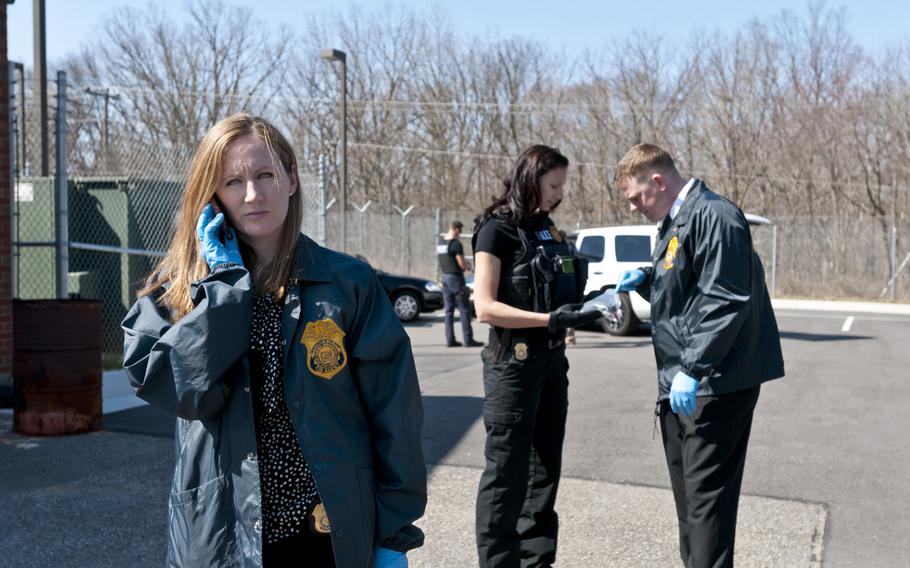
The criminal investigative agencies of the military service branches failed to consistently provide victims of specially defined crimes, including sexual assault, with appropriately trained investigators, according to a report released Wednesday by the Defense Department Inspector General. Army Criminal Investigation Division, seen in this photo, did so 91% of the time, the Naval Criminal Investigative Service did so 84% of the time and the Air Force Office of Special Investigations lagged with just 34% of cases getting a certified lead investigator. (Army Criminal Investigation Command)
The military is failing to provide all victims of specially defined crimes, including sexual assaults, appropriate criminal investigators and prosecutors as outlined by federal law, according to a report from the Defense Department’s inspector general.
The findings call into question whether those victims received thorough investigations and support services, according to a report.
“We found that the [Defense Department] cannot ensure that all victims of sexual assault are receiving support services available to them. We also found that the DoD cannot ensure that all commanders and investigators are making decisions based on the best possible information because of, among other things, inexperienced or untrained prosecutors," Sean O'Donnell, the acting Defense Department Inspector General, said in statement provided with the report Wednesday.
Federal law requires the Defense Department and the criminal investigative agencies for each military service branch provide victims with specially trained personnel in cases involving child abuse, serious domestic violence, or sexual offenses. The inspector general determined the investigative agencies did not consistently assign certified lead investigators for investigations of those crimes. It also found investigators did not consistently document communications with special victim personnel, and the services did not consistently assign specially trained prosecutors to those cases.
The IG reviewed 447 cases that occurred between June 2018 and May 2020 from across the services in which the nature of the case called for specialized personnel.
The Air Force had the worst record for assigning appropriate lead investigators and prosecutors. It failed to ensure it assigned special-victim prosecutors in 94% of its cases, according to the report. The Army failed half of the time, the Navy failed 59% of the time and the Marine Corps did not do so in 11% of cases.
“Further, the prosecutors assigned to handle the cases we reviewed were generally junior in grade, less experienced, and lacking specialized training specific to special victim cases. This occurred because the number of available specially trained special-victim prosecutors has not kept pace with the increased number of special-victim investigations,” according to the report.
When it comes to sexual assault, the military has seen the cases more than double from fiscal year 2011 to 2019. However, the report found there hasn’t been a corresponding increase in the necessary resources and personnel.
The criminal investigative agencies, which include the Army Criminal Investigation Division, the Naval Criminal Investigative Service and the Air Force Office of Special Investigations, had slightly better records of providing lead investigators who were certified for special victims’ cases. The Army did so 91% of the time and the Navy, which also conduct criminal investigations for the Marines, did so 84% of the time. However, the Air Force lagged with just 34% of cases getting a certified lead investigator.
The Air Force agency’s director of law enforcement cited a lack of resources among increased cases as the problem, according to the report.
Victims are also required to get support from a certified victim advocate, which the report found was done in all cases reviewed for the Army, Navy, Air Force, and Marine Corps.
The IG report offered three recommendations to help the military meet its federal mandates, and some agencies have already begun to make progress toward meeting them.
It called on each investigative branch to review the resource requirements to train, certify and assign additional criminal investigators when necessary and the service secretaries use their authority to provide the additional resources.
Army CID agreed with the recommendation, but it did not address the resource review, while the leaders of NCIS and Air Force OSI agreed and recently completed resource reviews, according to the report. NCIS is scheduled to receive additional personnel and funding in fiscal year 2022 and the Air Force has requested additional personnel.
A second recommendation called for the investigative agencies to develop procedures to standardize how their investigators better document communications with special-victim personnel, to which all three agencies agreed.
Finally, the report called on the undersecretary of defense for personnel and readiness to work with the service branches legal teams to determine whether to reestablish the Department of Defense requirement that special-victim prosecutors participate in certain notifications, collaborations and consultations. The recommendation is under review, according to the report.
In a Wednesday news conference that preceded the report’s release, chief Pentagon spokesman John Kirby said Defense Secretary Lloyd Austin had yet to see the full report.
“Obviously, the secretary takes very seriously the scourge of sexual assault and sexual harassment on the force,” he said. “The secretary has made clear we have to stop kicking the can down the road on this. It’s time for innovative solutions.”
The IG will continue its review of how special victims are treated in the military, particularly when it comes to sexual assault. On Monday, it announced it will begin an evaluation of how the military investigative agencies conduct sexual-assault investigations involving adult victims. It will review cases opened and closed between Jan. 1, 2019, and Dec. 31, 2020, according to a memo written by Randolph R. Stone, assistant inspector general for evaluations of space, intelligence, engineering and oversight.
The evaluation aims to understand the extent to which these crimes are investigated.